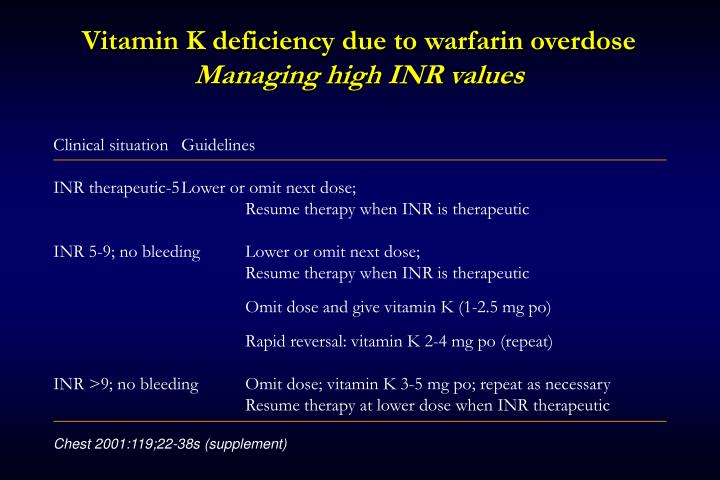
Normal INR (not on anticoagulants) is 0.8–1.2. Therapeutic PT ranges 1.3–1.5 times greater than control however, the INR, a standardized system that provides a common basis for communicating and interpreting PT results, is usually referenced. Monitor PT, INR, and other clotting factors frequently during therapy monitor more frequently in patients with renal impairment.
Assess for evidence of additional or increased thrombosis. Assess for signs of bleeding and hemorrhage (bleeding gums nosebleed unusual bruising tarry, black stools hematuria fall in hematocrit or BP guaiac-positive stools, urine, or nasogastric aspirate). Ingestion of large quantities of foods high in vitamin K content (see list in food sources for specific nutrients) may antagonize the anticoagulant effect of warfarin. ↑ bleeding risk with anise, arnica, chamomile, clove, dong quai, fenugreek, feverfew, garlic, ginger, ginkgo, Panax ginseng, licorice , and others. Many other drugs may affect the activity of warfarin. Barbiturates, carbamazepine, rifampin, and hormonal contraceptives containing estrogen may ↓ the anticoagulant response to warfarin. Acute alcohol ingestion may ↑ action of warfarin. Chronic alcohol ingestion may ↓ action of warfarin if chronic alcohol abuse results in significant liver damage, action of warfarin may be ↑ due to ↓ production of clotting factor. Chronic use of acetaminophen may ↑ the risk of bleeding. 

Androgens, capecitabine, cefotetan, chloramphenicol, clopidogrel, disulfiram, fluconazole, fluoroquinolones, itraconazole, metronidazole (including vaginal use), thrombolytics, eptifibatide, tirofiban, sulfonamides, quinidine, quinine, NSAIDs, valproates, and aspirin may ↑ the response to warfarin and ↑ the risk of bleeding.






 0 kommentar(er)
0 kommentar(er)
